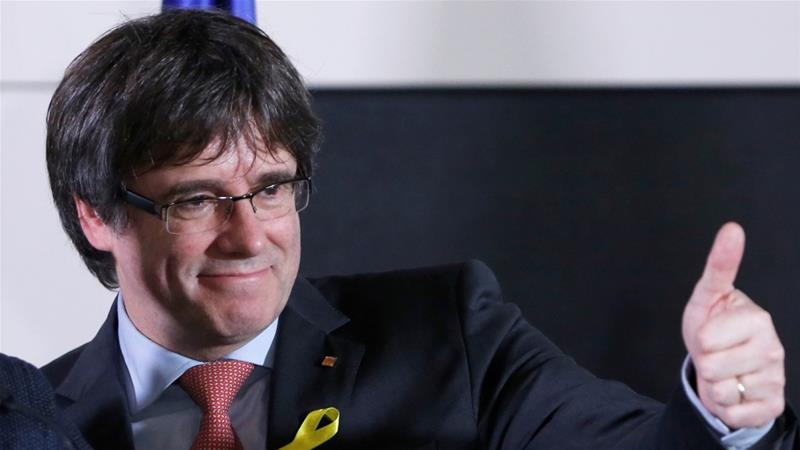Home » World News »
Puigdemont, facing charges, to be Catalan president
Carles Puigdemont is the candidate to head the Catalan regional government, continuing the independence saga in Spain.
Catalonia’s former president vowed to form a new government in the region that recently elected politicians seeking to break away from Spain, brushing aside what he called Madrid’s “threats” and “oppression”.
Carles Puigdemont made the comments after it was announced on Monday he will be the candidate for president of Catalonia’s regional government.
Separatist parties maintained their absolute majority in the Catalan parliament in late December, after a vote in a snap election called by Spanish Prime Minister Mariano Rajoy.
“We will not surrender to authoritarianism despite Madrid’s threats,” said Puigdemont during a debate on Catalonia at the University of Copenhagen.
“Soon we will form a new government … It’s time to end their oppression and find a political solution for Catalonia.”
The former president led the charge to separate from Spain as head of the Together for Yes coalition from 2015 to 2017, when the Catalan government was dissolved after declaring independence.
Puigdemont fled Catalonia for Belgium shortly after the declaration, which was not recognised by any sovereign nations.
He risks being arrested if he returns from self-imposed exile, following rebellion and sedition charges the Spanish government and judges levied against him.
The Catalan parliament will vote to decide its leadership roles and the presidency by January 31.
Puigdemont’s presidential candidacy was confirmed on Monday by Roger Torrent, speaker of the regional parliament.
“I am conscious of the warnings that weigh upon him, but I am also conscious of his absolute legitimacy to be candidate,” Torrent said.
Puigdemont left Brussels for Copenhagen to attend the conference on Monday.
Spanish prosecutors attempted to have a European arrest warrant for Puigdemont re-issued as he arrived in Copenhagen, his first trip outside of Belgium since fleeing Spain.
But Supreme Court Judge Pablo Llarena turned down the request, arguing Puigdemont had gone to Denmark “to provoke this arrest abroad” as part of a strategy to help his chances of being allowed to be sworn in as president of Catalonia again.
The Spanish government has charged roughly a dozen former Catalan ministers with various crimes, including sedition and rebellion, in relation to their actions leading up to the declaration of independence.
Puigdemont was charged after he fled Spain. The Spanish High Court issued an EU-wide arrest warrant for him, but it was not enforced by Belgium.
Deja Vu
The results of the December vote were similar to those of a 2015 election that put separatists in power. Rajoy hoped to restore stability to the restive region, but results failed to put pro-unity parties in power.
The pro-unity Citizens party, which refuses to place itself on the political spectrum but consistently votes right-wing conservative, won the largest number of seats, with 36.
Puigdemont’s party, Together for Catalonia, won 35, and the Republican Left of Catalonia (ERC), another separatist party, garnered 32.
ERC’s leader Oriol Junqueras is the only Catalan politician who remains in prison.
The previous Catalan government was dissolved in October, when parliament voted to declare independence from Spain following the disputed referendum, wherein roughly 90 percent of voters chose to secede, but less than 50 percent of the electorate showed up at the polls.
The Spanish government enacted the previously unused Article 155 of the constitution, which gives it the power to directly administer regions.
It sent national police to prevent the referendum from taking place, which ended in violence against voters that rights groups called an “excessive use of force”.
Rajoy said last week that Puigdemont cannot govern from Brussels. If he attempts to do so, Rajoy promised to continue the implementation of Article 155, which does not have a time limit.
Source: Read Full Article



